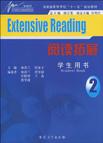阅读拓展·学生用书(第二册)
1970-1
安徽大学出版社
黄学静,等 编
230
21世纪是一个高度全球化的时代,社会对英语人才的需求也已呈现多元化趋势。培养具有扎实的基本功、宽广的知识面、一定的专业知识、较强能力和较好素质的新型英语专业人才,是我国目前对高等学校英语专业教学的迫切要求。与之相适应,编写符合新的时代要求的英语专业教材自然也成为广大师生的必然需要。 根据高等学校外语教学指导委员会《关于外语专业面向21世纪本科教育改革的若干意见》,21世纪英语专业教材至少应具备以下几个基本特征:(1)教学内容和语言能够反映快速变化的时代;(2)要处理好专业知识、语言训练和相关学科知识间的关系;(3)教材不仅仅着眼于知识的传授,而且要有助于学生的鉴赏批评能力、思维能力、创新能力的培养;(4)具有较强的实用性和针对性。 针对这些要求,结合近几年高等学校英语专业教学改革的实践经验,以及我省英语教学的实际需要,安徽大学外语学院张红霞博士等主持设计了新教材的编写方案,安徽大学出版社组织了数位省内英语教学专家,对教材编写方案进行了多次研讨与论证,在尽量吸取国内其他英语专业教材及公共英语教材、国外主要英语(外语)教材宝贵经验的基础上,注意取其长并避缺、补短,力求新教材科学、有效且有所突破与创新。 在科学论证、广泛讨论的基础上,我们组织全省十几所高校英语专业院系的骨干力量,编写了这套“新开端英语专业基础课系列教材”。作为安徽省自主编写的第一套英语专业基础课教材,本套教材从一开始就受到安徽省教育厅的充分肯定、重视,被列入安徽省高等学校“十一五”规划教材。 本套教材包括三种:《读写教程》、《视听说》及《阅读拓展》,每种4册,每册均有相配套的教师用书,适合大学英语专业一、二年级的学生及相应水平的英语学习者使用。教师用书不仅附有学生用书练习答案,还为教师提供了丰富的背景、专业知识介绍以及相应的教学建议,方便教师使用。 本套教材具有以下主要特点: 1.以整体语言理论为指导,充分体现“同步发展”的编写理念。每种教材在突出自身重点的基础上,又注重听、说、读、写、译技能的全面发展和提高。三种教材不同的课型间有着密切联系,每种每册教材的相应单元都围绕同一主题,从不同的角度加以编排,内容互相关联,便于学习互动、迁移。由此可以拓宽学生视野,提高基础词汇、重点词汇的出现率,扩大词汇量,使重点语言知识、文化信息在不同的情境中反复出现,得到强化,加深记忆,促进学生对语言的理解和接受,有效地提高学习效果。可以说,整套教材的“套”的概念名副其实,不仅能够促进任课教师之间互相交流、统一进度,而且能够提高学生的学习兴趣,促进学生语言能力全面、均衡地发展。
21世纪是一个高度全球化的时代,社会对英语人才的需求也已呈现多元化趋势。培养具有扎实的基本功、宽广的知识面、一定的专业知识、较强能力和较好素质的新型英语专业人才,是我国目前对高等学校英语专业教学的迫切要求。与之相适应,编写符合新的时代要求的英语专业教材自然也成为广大师生的必然需要。 根据高等学校外语教学指导委员会《关于外语专业面向21世纪本科教育改革的若干意见》,21世纪英语专业教材至少应具备以下几个基本特征:(1)教学内容和语言能够反映快速变化的时代;(2)要处理好专业知识、语言训练和相关学科知识间的关系;(3)教材不仅仅着眼于知识的传授,而且要有助于学生的鉴赏批评能力、思维能力、创新能力的培养;(4)具有较强的实用性和针对性。
Unit 1 People and PlacesUnit 2 Entertainment and RecreationUnit 3 EducationUnit 4 Man and NatureUnit 5 SocietyUnit 6 Culture and history(Ⅰ)Unit 7 Culture and history(Ⅱ)Unit 8 Holidays and FestivalsUnit 9 Health and MedicineUnit 10 Human MindUnit 11 LiteratureUnit 12 Science and Technology
It was on such an occasion the other evening, as the conversation moved desultorily here and there, from the most commonplace to thoughts of Jupiter, without any focus and with no need for one, that suddenly the alchemy of conversation took place, and all at once there was a focus. I do not remember what made one of our companions say it she clearly had not come into the bar to say it, it was not something that was pressing on her mind——but her remark fell quite naturally into the talk."Someone told me the other day that the phrase, 'the King's English' was a term of criticism, that it means language which one should not properly use. " The glow of the conversation burst into flames. There were affirmations and protests and denials, and of course the promise, made in all such conversation, that we would look it up on the morning. That would settle it; but conversation does not need to be settled; it could still go ignorantly on. It was an Australian who had given her such a definition of "the King's English," which produced some rather tart remarks about what one could expect from the descendants of convicts. We had traveled in five minutes to Australia. Of course, there would be resistance to the King's English in such a society. There is always resistance in the lower classes to any attempt by an upper class to lay down rules for "English as it should be spoken. " Look at the language barrier between the Saxon churls and their Norman conquerors. The conversation had swung from Australian convicts of the 19th century to the English peasants of the 12th century. Who was right, who was wrong, did not matter. The conversation was on wings. Someone took one of the best-known of examples, which is still always worth the reconsidering. When we talk of meat on our tables we use French words ; when we speak of the animals from which the meat comes we use Anglo-Saxon words. It is a pig in its sty; it is pork (porc) on the table. They are cattle in the fields, but we sit down to beef (boeuf). Chickens become poultry ( poulet), and a calf becomes veal (veau). Even if our menus were not written in French out of snobbery, the English we used in them would still be Norman English. What all this tells us is of a deep class rift in the culture of England after the Norman conquest. The Saxon peasants who tilled the land and reared the animals could not afford the meat, which went to Norman tables. The peasants were allowed to eat the rabbits that scampered over their fields and, since that meat was cheap, the Norman lords of course turned up their noses at it. So rabbit is still rabbit on our tables, and not changed into some rendering of lapin. As we listen today to the arguments about bilingual education, we ought to think ourselves back into the shoes of the Saxon peasant. The new ruling class had built a cultural barrier against him by building their French against his own language. There must have been a great deal of cultural humiliation felt by the English when they revolted under Saxon leaders like Hereward the Wake. " The King's English "——if the term had existed then had become French. And here in America now, 900 years later, we are still the heirs to it. ……
